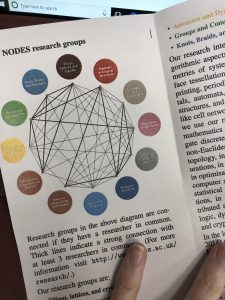Last week, Dr Eve Forrest, ESRC IAA Officer attended an industry-facing event put on by the NODES network, she tells us here about the potential connections to be made by social sciences across disciplines and with industry
Last week I went to an afternoon organised by NODES (North East Organisation of Discrete Structures) a group of Mathematicians and Computer Scientists based at Newcastle and Durham Universities. This was slightly unknown territory for me as I am based in the HaSS (Humanities and Social Science) Faculty in Newcastle University and my own interdisciplinary research interests are based in the Humanities although I have dabbled outside of this sphere. I was there out of curiosity because I have been tasked by the ESRC as part of my role to think about how social science postgraduate students and early career academics can get better connected with local businesses and industry (this blog post written by Tim Vorley from Sheffield University and Melanie Knetsch from the ESRC, outlines the context for this and why it is important for future potential funding in the social sciences).
The industry day was split into two sections: showing links between Newcastle PhD students (both present and former) with a computational and mathematical background and their journey into industry. Alongside those were a quick set of ‘speed dating’ presentations, where local, national and multinational businesses, presented some of the areas they were working on, the challenges they faced and the areas they were interested in developing with NODES. Through the pure mathematical and computational language I was listening out for potential areas where social science could intersect with and help on some of the industry problems outlined in the presentations and was happy to find there was there was plenty to think about.
The buzz of course, across multiple disciplines,is about data (both big and small) and about how it is gathered, sorted, processed and what stories it can tell us (and more recently the ethical implications of its harvesting and life beyond the user thanks to the expose of Cambridge Analytica). Humans can be very predictable in their habits which can be broadly mapped, learned and shaped by machines and algorithms, yet they can also be deeply unpredictable and their interactions complex, beyond the (current) understanding of AI. It was clear that some of the issues posed by industry could not be solved by maths alone. Social science also has a role in directly challenging the often sweeping conclusions that have been made from and about Big Data too as danah boyd and Kate Crawford** (2015) write:
‘we must ask difficult questions of Big Data’s models of intelligibility before they crystallize into new orthodoxies’
Social science can offer valuable insight, working with other disciplines feeding into both these known and unknown strands.
At the break I managed to get a chance to speak to one of the presenters Abi Giles-Haigh, alumni of Newcastle University who now works as Head of Data Science at North-East based company Caspian. I told her I was there as a bit of an outlier and how pleased I was that she mentioned in her presentation how important the different interdisciplinary aspects were to her team (pulling from diverse areas such as psychology, sociology, statistics and computing). She nodded and said ‘ultimately, I see us all as data scientists, no matter where we sit’.
There are an infinite number of nodes, structures and complex interactions that underpin everyday life which social science can help interrogate and interpret. I look forward to future joints events with the ESRC, EPSRC and NODES to explore the possibilities of collaboration and where areas of knowledge and interests overlap. If we are all going to be data scientists, this seems like the best place to start.

